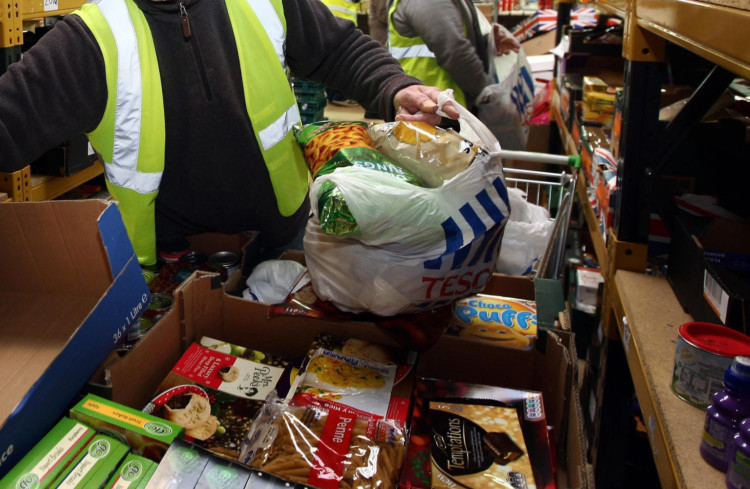
Just days before most people sit down to their Christmas lunch the charity behind Britain’s biggest network of food banks has revealed they’ve helped a record half a million people since the spring.
More people than ever will struggle to eat on Christmas Day.
A record number will only have a charity food package made up of staples to last three days, plus possibly a Christmas treat of a box of mince pies or a Christmas pudding.
The Trussell Trust runs nearly 400 food banks.
Last year they handed out food parcels to 346,000 people, all referred by health professionals or social services.
In this financial year, only since the start of April, they’ve already helped 500,000 people.
Around a third of those who would go hungry without food aid are thought to be children.
At this time of year there’s an even greater demand as the cold weather pushes up fuel costs and tips more people into poverty.
Plus there’s the pressure on parents to ensure kids have not just something to eat but something to open on December 25.
A spokeswoman for the Trussell Trust explained the reality of the problem: “We had a couple come to a food bank who were in work but had both been made redundant then had to take lower-paid jobs just to pay the mortgage which they were tied into. They didn’t have any money left over for food.
“They wrapped up some of their children’s old toys just so the kids had something to open on Christmas morning.
“The level of food bank use is not acceptable. Too many people face going hungry on Christmas day.”
A petition calling on the Government to debate the issue attracted nearly 140,000 signatures within days.
Labour have taken up the call and have scheduled a debate on food banks this week in some of the Commons time allotted to the Opposition.
The Trussell Trust are pleased. Their spokeswoman added: “MPs need to be made aware of the reality on the ground. There’s a lot of misunderstanding about what food banks do and who they help.
“The debate offers a great opportunity to set the record straight.”
Shadow environment secretary Maria Eagle will open the debate.
She said: “The number of people relying on food banks and food aid is rising exponentially.
“It should ring alarm bells for all politicians.”
An opposition day debate cannot force the Government to act, which does raise questions about the point of holding one at all.
However, Eagle believes she can achieve something.
Earlier in the year the Department for the Environment, Food and Rural Affairs (Defra) committed to carrying out research into the rise in food bank use.
Despite saying the results of that research would be published in the summer, it’s yet to be seen.
Eagle added: “The debate is an opportunity to highlight the issues around food banks and press the Government on why they have refused to produce their research.
“They say there is no link to their policies, so why not publish the research?
“Once we’ve all seen the research we can formulate policies that would alleviate the problem.”
Food bank use is a symptom of a wider malaise.
It is linked to changes in the welfare system the Trussell Trust says much of the increase in food bank use is down to delays in welfare payments or new policies such as the bedroom tax as well as people having to make their money stretch further due to higher fuel and food bills.
Eagle added: “I’ve heard of people handing food back to the bank because they can’t afford to turn the cooker on to heat it.”
Her suggestions for tackling the problem are simply a list of Labour policies on the economy and prices, such as the fuel price freeze and clamping down on low pay and zero-hour contracts.
Nobody would suggest Labour want to see more people going hungry, but the figures on food banks chime nicely with their narrative on the cost of living crisis.
Eagle disagrees. “The increase in food bank use is not politically good for us.
“It’s a symptom of wider problems that in the space of a year we’ll probably see 750,000 people, a third of them children, finding it hard to meet basic needs in life in Britain.
“That should be a wake-up call to all politicians to change that.”

Enjoy the convenience of having The Sunday Post delivered as a digital ePaper straight to your smartphone, tablet or computer.
Subscribe for only £5.49 a month and enjoy all the benefits of the printed paper as a digital replica.
Subscribe